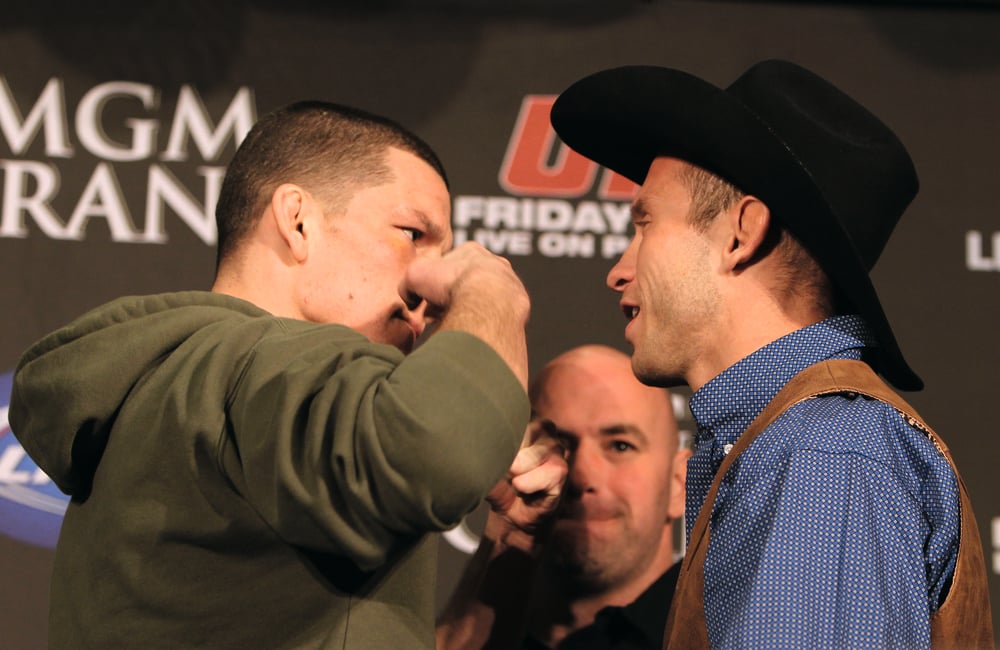
Issue 087
April 2012
He who angers you, conquers you
In elite mixed martial arts the smell of bad blood paves the way for hungry reporters, sell-out arenas, soaring pay-per-view buys and frankly great viewing. There’s a whole field of psychology dedicated to why humans take pleasure from watching two people knocking seven bells out of each other, but that’s for another day.
Rivalry is a natural phenomenon that occurs in all species. In ours, it stems from man’s deep-rooted desire to solidify his top-dog status, and ensure the survival of his genes by bedding as many females as possible. As primitive as this innate psychological theory sounds, the underlying truth is that this is our instinctive hardwiring and is difficult to deny. But the rationale behind why modern-day fighters feel the need to initiate the ritual of rivalry (usually in the form of trash talk) is much more complex. And how they handle it varies between fighters.
There are different schools of thought on this matter, but here are two of the most common.
The key to keeping a lid on your emotions and preventing your opponent from riling you, which in many cases impedes fighting performance, is to be more self-aware. Research shows that self-awareness is 75% of any solution to improving performance. By tuning into the triggers that set you off, you are one step closer to emotional mastery.
The problem for many fighters is they often get caught up in the heat of bitter rivalry and become blinded by red mist. It’s at times like these coaches and those cornering a fighter play a crucial role. By asking their fighter simple open questions that relate to the following elements: thought, feeling, will and action, they are able to see where their head is at and steer them away from counterproductive actions. For example:
How much is this guy p***ing you off?
How much do you want to punish him?
How much does the s**t he’s talking bother you?
Each question should be ranked on a scale of 1–5 (5 being high). If scores are above seven the fighter is in an overly intense state, which can harm performance. They need to re-center. Anger and hatred should be used as a source of motivation to intensify training, but it shouldn’t be allowed to enter the Octagon. There’s no margin for error in this sport. Know thyself.
ANTAGONISTS
Antagonists have an ulterior motive behind their strategic bating. They want to get under the skin of their opponent by luring out their ego and mauling it in front of the world. If they hit their target successfully it can knock the confidence of their adversary, flooding their body with stress hormones causing excess muscle tension and neutralizing reflexes.
EXAMPLE: The Sonnen vs Silva saga. The king of trash-talk has only one object in his crosshairs and that’s ‘The Spider’s self-confidence. Chael is calculating and knows the source of Anderson’s talent: his belief in his abilities.
Leading up to UFC 117 Sonnen’s own confidence appeared to counter Silva’s. This state of self-confidence improves overall performance, increases physiological thresholds, and intensifies the will to win. Chael poured this into the Octagon by proving he could out strike and consistently punish the pound-for-pound best fighter on the planet.
INSTIGATORS
For some fighters, instigating conflict is a natural reflex to an imminent fight. Combat sets alight the brain’s emotional command center, causing sensations of fear, which translates into acts of anger and hostility as a response. These feeling dissipate almost instantly the moment the clash is over.
EXAMPLE: The Diaz brothers are renowned for this tactic and they stick to a simple philosophy: a fight is a fight – shake hands after the final bell rings. When Nate Diaz disrespected Donald Cerrone ahead of their UFC 141 clash in December, by slapping his hand away and at the pre-fight staredown launching his hat, the ‘Cowboy’ had the fuel he needed to stoke his rage.
Hate has a way of making people feel alive and payback is an incredible motivator for training, generating drive and energy. Cerrone made no attempt to hide his disdain for the Stockton native admitting: “I fight good p***ed off.”
The issue here is that becoming angry is different than allowing your opponent to make you angry. When you react with anger fueled by hatred, you give up self-control, which can blur focus and drain energy. This was clear as day, as Cerrone took an unusual amount of punishment from Diaz. But what enabled an equally jacked-up Diaz to fire on all cylinders most likely lies in adaptation. For two brothers, who make no bones about a hard childhood and being bullied, it points to the experience of conflict. Those exposed to more of it are better equipped at dealing with it.













